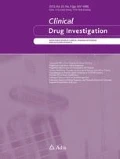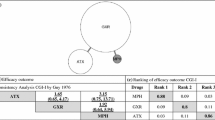Abstract
Epilepsy is common in children and adolescents where its prevalence is 3.2–5.5/1000. About one-third of patients also have attention deficit hyperactivity/impulsivity disorder (ADHD). The possible relationship between epilepsy and ADHD is still unclear, and ADHD symptoms (such as inattention, hyperactivity, behavioral disturbances) are frequently considered as adverse effects of antiepileptic drugs (AEDs). The literature was searched for data on the behavioral effects of AEDs. Phenobarbital is the most frequently reported medication to induce symptoms of ADHD, followed by topiramate and valproic acid. Phenytoin seems to exert modest effects, while for levetiracetam there are contrasting data. Lacosamide induces some beneficial effects on behavior; carbamazepine and lamotrigine exert favorable effects on attention and behavior. Gabapentin and vigabatrin have limited adverse effects on cognition. Oxcarbazepine, rufinamide, and eslicarbazepine do not seem to aggravate or induce ADHD symptoms, whereas perampanel can lead to a high incidence of hostile/aggressive behavior, which increases with higher dosages. Information about the behavioral effects of ethosuximide, zonisamide, tiagabine, pregabalin, stiripentol, and retigabine is still limited. Because ADHD significantly affects the quality of life of epilepsy patients, the clinical management of this neuropsychiatric disorder should be a priority. Methylphenidate is effective most children and adolescents with ADHD symptoms and comorbid epilepsy, without a significant increase of seizure risk, although data are still limited with few controlled trials.
Similar content being viewed by others
References
Camfield P, Camfield C. Incidence, prevalence and aetiology of seizures and epilepsy in children. Epileptic Disord. 2015;17:117–23.
Parisi P, Moavero R, Verrotti A, Curatolo P. Attention deficit hyperactivity disorder in children with epilepsy. Brain Dev. 2010;32:10–6.
Lin JJ, Mula M, Hermann BP. Uncovering the neurobehavioral comorbidities of epilepsy over the lifespan. Lancet. 2012;380:1180–92.
Besag F, Gobbi G, Caplan R, Sillanpaa M, Aldenkamp A, Dunn DW. Psychiatric and behavioral disorders in children with epilepsy (ILAE Task Force Report): epilepsy and ADHD. Epileptic Disord. 2016;. doi:10.1684/epd.2016.0811.
Williams AE, Giust JM, Kronenberger WG, Dunn DW. Epilepsy and attention-deficit hyperactivity disorder: links, risks, and challenges. Neuropsychiatr Dis Treat. 2016;12:287–96.
Jensen V, Rinholm JE, Johansen TJ, Medin T, Storm-Mathisen J, Sagvolden T, et al. N-methyl-d-aspartate receptor subunit dysfunction at hippocampal glutamatergic synapses in an animal model of attention-deficit/hyperactivity disorder. Neuroscience. 2008;158:353–64.
Howells FM, Russell VA. Glutamate-stimulated release of norepi- nephrine in hippocampal slices of animal models of attention- deficit/hyperactivity disorder (spontaneously hypertensive rat) and depression/anxiety-like behaviors (Wistar-Kyoto rat). Brain Res. 2008;1200:107–15.
Gilby KL. A new rat model for vulnerability to epilepsy and autism spectrum disorders. Epilepsia. 2008;49(Suppl. 8):108–10.
Medel-Matus JS, Shin D, Sankar R, Mazarati A. Galanin contributes to monoaminergic dysfunction and to dependent neurobehavioral comorbidities of epilepsy. Exp Neurol. 2017;289:64–72.
Selemon LD. Frontal lobe synaptic plasticity in development and disease: modulation by the dopamine D1 receptor. Curr Pharm Des. 2014;20:5194–201.
Goldin RL, Matson JL, Tureck K, Cervantes PE, Jang J. A comparison of tantrum behavior profiles in children with ASD, ADHD and comorbid ASD and ADHD. Res Dev Disabil. 2013;34:2669–75.
Gonzalez-Heydrich J, Whitney J, Waber D, Forbes P, Hsin O, Faraone SV, et al. Adaptive phase I study of OROS methylphenidate treatment of attention deficit hyperactivity disorder with epilepsy. Epilepsy Behav. 2010;18:229–37.
Koneski JA, Casella EB, Agertt F, Ferreira MG. Efficacy and safety of methylphenidate in treating ADHD symptoms in children and adolescents with uncontrolled seizures: a Brazilian sample study and literature review. Epilepsy Behav. 2011;21:228–32.
Socanski D, Aurlien D, Herigstad A, Thomsen PH, Larsen TK. Epilepsy in a large cohort of children diagnosed with attention deficit/hyperactivity disorders (ADHD). Seizure. 2013;22:651–5.
Dunn DW, Austin JK, Harezlak J, Ambrosius WT. ADHD and epilepsy in childhood. Dev Med Child Neurol. 2003;45:50–4.
Reilly CJ. Attention deficit hyperactivity disorder (ADHD) in childhood epilepsy. Res Dev Disabil. 2011;32:883–93.
Prevost J, Lortie A, Nguyen D, Lassonde M, Carmant L. Nonlesional frontal lobe epilepsy (FLE) of childhood: clinical presentation, response to treatment and comorbidity. Epilepsia. 2006;47:2198–201.
Moavero R, Santarone ME, Galasso C, Curatolo P. Cognitive and behavioral effects of new antiepileptic drugs in pediatric epilepsy. Brain Dev. 2017;39:464–9.
De Liso P, Moavero R, Coppola G, Curatolo P, Cusmai R, De Sarro G, et al. Current role of perampanel in pediatric epilepsy. Ital J Pediatr. 2017;43:51.
Glauser TA, Cnaan A, Shinnar S, Hirtz DG, Dlugos D, Masur D, et al. Ethosuximide, valproic acid, and lamotrigine in childhood absence epilepsy. N Engl J Med. 2010;362:790–9.
Masur D, Shinnar S, Cnaan A, Shinnar RC, Clark P, Wang J, et al. Pretreatment cognitive deficits and treatment effects on attention in childhood absence epilepsy. Neurology. 2013;81:1572–80.
Brandl U, Kurlemann G, Neubauer B, Rettig K, Schauble B, Schreiner A. Seizure and cognitive outcomes in children and adolescents with epilepsy treated with topiramate. Neuropediatrics. 2010;41:113–20.
Park SP, Kim SY, Hwang YH, Lee HW, Suh CK, Kwon SH. Long-term efficacy and safety of zonisamide monotherapy in epilepsy patients. J Clin Neurol. 2007;3:175–80.
White JR, Walczak TS, Marino SE, Beniak TE, Leppik IE, Birnbaum AK. Zonisamide discontinuation due to psychiatric and cognitive adverse events: a case-control study. Neurology. 2010;75:513–8.
Han SA, Yang EJ, Song MK, Kim SJ. Effects of lamotrigine on attention-deficit hyperactivity disorder in pediatric epilepsy patients. Korean J Pediatr. 2017;60:189–95.
Riva D, Devoti M. Carbamazepine withdrawal in children with previous symptomatic partial epilepsy: effects on neuropsychologic function. J Child Neurol. 1999;14:357–62.
Eun SH, Eun BL, Lee JS, et al. Effects of lamotrigine on cognition and behavior compared to carbamazepine as monotherapy for children with partial epilepsy. Brain Dev. 2012;34:818–23.
Helmstaedter C, Witt JA. The longer-term cognitive effects of adjunctive antiepileptic treatment with lacosamide in comparison with lamotrigine and topiramate in a naturalistic outpatient setting. Epilepsy Behav. 2013;26:182–7.
Ijff DM, van Veenendaal TM, Majoie HJ, de Louw AJ, Jansen JF, Aldenkamp AP. Cognitive effects of lacosamide as adjunctive therapy in refractory epilepsy. Acta Neurol Scand. 2015;131:347–54.
Pasha I, Kamate M, Suresh DK. Safety of lacosamide in children with refractory partial epilepsy. Saudi Pharm J. 2015;23:556–61.
Donati F, Gobbi G, Campistol J, et al. The cognitive effects of oxcarbazepine versus carbamazepine or valproate in newly diagnosed children with partial seizures. Seizure. 2007;16:670–9.
Kim D, Seo JH, Joo EY, Lee HW, Shin WC, Hong SB. Cognitive and psychosocial effects of oxcarbazepine monotherapy in newly diagnosed partial epilepsy. Clin Neuropharmacol. 2014;37:100–7.
Milovan D, Almeida L, Romach MK, Nunes T, Rocha JF, Sokowloska M, et al. Effect of eslicarbazepine acetate and oxcarbazepine on cognition and psychomotor function in healthy volunteers. Epilepsy Behav. 2010;18:366–73.
Aldenkamp AP, Alpherts WC. The effect of the new antiepileptic drug rufinamide on cognitive functions. Epilepsia. 2006;47:1153–9.
Vining EP, Mellitis ED, Dorsen MM, Cataldo MF, Quaskey SA, Spielberg SP, et al. Psychologic and behavioral effects of antiepileptic drugs in children: a double-blind comparison between phenobarbital and valproic acid. Pediatrics. 1987;80:165–74.
Paolicchi JM, Ross G, Lee D, Drummond R, Isojarvi J. Clobazam and aggression-related adverse events in pediatric patients with Lennox-Gastaut Syndrome. Pediatr Neurol. 2015;53:338–42.
Sheth RD, Goulden KJ, Ronen GM. Aggression in children treated with clobazam for epilepsy. Clin Neuropharmacol. 1994;17:332–7.
Chen B, Detyniecki K, Choi H, Hirsch L, Katz A, Legge A, Wong R, Jiang A, Buchsbaum R, Farooque P. Psychiatric and behavioral side effects of anti-epileptic drugs in adolescents and children with epilepsy. Eur J Paediatr Neurol. 2017;21:441–9.
Aldenkamp A, Besag F, Gobbi G, Caplan R, Dunn DW, Sillanpaa M. Psychiatric and behavioral disorders in children with epilepsy (ilae task force report): adverse cognitive and behavioral effects of antiepileptic drugs in children. Epileptic Disord. 2016;. doi:10.1684/epd.2016.0817.
Lee DO, Steingard RJ, Cesena M, Helmers SL, Riviello JJ, Mikati MA. Behavioral side effects of gabapentin in children. Epilepsia. 1996;37:87–90.
Schiemann-Delgado J, Yang H, Loge Cde L, Stalvey TJ, Jones J, Legoff D, et al. A long-term open-label extension study assessing cognition and behavior, tolerability, safety, and efficacy of adjunctive levetiracetam in children aged 4 to 16 years with partial-onset seizures. J Child Neurol. 2012;27:80–9.
Matsuo M, Fuji A, Matsuzaka T, Baba H, Toda K, Ono T, et al. Effectiveness and safety of long-term levetiracetam treatment in patients with refractory epilepsy. No To Hattatsu. 2015;47:272–8.
Levisohn PM, Mintz M, Hunter SJ, Yang H. Jones J; NLS Group. Neurocognitive effects of adjunctive levetiracetam in children with partial-onset seizures: a randomized, double-blind, placebo-controlled, noninferiority trial. Epilepsia. 2009;50:2377–89.
Rosenfeld W, Conry J, Lagae L, Rozentals G, Yang H, Fain R, et al. Efficacy and safety of perampanel in adolescent patients with drug-resistant partial seizures in three double-blind, placebo-controlled, phase III randomized clinical studies and a combined extension study. Eur J Paediatr Neurol. 2015;19:435–45.
Biro A, Stephani U, Tarallo T, Bast T, Schlachter K, Fleger M, et al. Effectiveness and tolerability of perampanel in children and adolescents with refractory epilepsies: first experiences. Neuropediatrics. 2015;46:110–6.
De Liso P, Vigevano F, Specchio N, De Palma L, Bonanni P, Osanni E, et al. Effectiveness and tolerability of perampanel in children and adolescents with refractory epilepsies-An Italian observational multicenter study. Epilepsy Res. 2016;127:93–100.
Garamendi-Ruiz I, Garcia-Garcia ME, Bertol-Alegre V, Mauri-Llerda JA, Garcia-Morales I, Garayoa-Irigoyen V, et al. One-year clinical experience of perampanel in Spain: a multicentre study of efficacy and tolerability. Epileptic Disord. 2016;18:173–80.
Lagae L, Villanueva V, Meador KJ, Bagul M, Laurenza A, Kumar D, et al. Adjunctive perampanel in adolescents with inadequately controlled partial-onset seizures: A randomized study evaluating behavior, efficacy, and safety. Epilepsia. 2016;57:1120–9.
Meador KJ, Yang H, Pina-Garza JE, Laurenza A, Kumar D, Wesnes KA. Cognitive effects of adjunctive perampanel for partial-onset seizures: A randomized trial. Epilepsia. 2016;57:243–51.
Ettinger AB, LoPresti A, Yang H, Williams B, Zhou S, Fain R, et al. Psychiatric and behavioral adverse events in randomized clinical studies of the noncompetitive AMPA receptor antagonist perampanel. Epilepsia. 2015;56:1252–63.
The MTA Cooperative Group. A 14-month randomized clinical trial of treatment strategies for attention-deficit/hyperactivity disorder. The MTA Cooperative Group. Multimodal Treatment Study of Children with ADHD. Arch Gen Psychiatry. 1999;56:1073–86.
NICE guidelines, September 2008. https://www.nice.org.uk/guidance/CG72/chapter/Recommendations#treatment-for-children-and-young-people. Accessed Sept 2017.
Joseph A, Ayyagari R, Xie M, Cai S, Xie J, Huss M, Sikirica V. Comparative efficacy and safety of attention-deficit/hyperactivity disorder pharmacotherapies, including guanfacine extended release: a mixed treatment comparison. Eur Child Adolesc Psychiatry. 2017;26:875–97.
Gross-Tsur V, Manor O, van der Meere J, Joseph A, Shalev RS. Epilepsy and attention deficit hyperactivity disorder: is methylphenidate safe and effective? J Pediatr. 1997;130:670–4.
Yoo HK, Park S, Wang HR, Lee JS, Kim K, Paik KW, et al. Effect of methylphenidate on the quality of life in children with epilepsy and attention deficit hyperactivity disorder: and open-label study using an osmotic-controlled release oral delivery system. Epileptic Disord. 2009;11:301–8.
Gucuyener K, Erdemoglu AK, Senol S, Serdaroglu A, Soysal S, Kockar AI. Use of methylphenidate for attention-deficit hyperactivity disorder in patients with epilepsy or electroencephalographic abnormalities. J Child Neurol. 2003;18:109–12.
Radziuk AL, Kieling RR, Santos K, Rotert R, Bastos F, Palmini AL. Methylphenidate improves the quality of life of children and adolescents with ADHD and difficult-to-treat epilepsies. Epilepsy Behav. 2015;46:215–20.
Liu Q, Zhang H, Fang Q, Qin L. Comparative efficacy and safety of methylphenidate and atomoxetine for attention-deficit hyperactivity disorder in children and adolescents: Meta-analysis based on head-to-head trials. J Clin Exp Neuropsychol. 2017;4:1–12.
McAfee AT, Landon J, Jones M, Bangs ME, Acharya N, Hornbuckle K, et al. A cohort study of the risk of seizures in a pediatric population treated with atomoxetine or stimulant medications. Pharmacoepidemiol Drug Saf. 2013;22:386–93.
Author information
Authors and Affiliations
Corresponding author
Ethics declarations
Funding
None.
Conflict of interest
Romina Moavero and Paolo Curatolo have received honoraria from Novartis. Alberto Verrotti, Gianvito Panzarino, Claudia Di Paolantonio and Renata Rizzo declared no conflict of interest
Rights and permissions
About this article
Cite this article
Verrotti, A., Moavero, R., Panzarino, G. et al. The Challenge of Pharmacotherapy in Children and Adolescents with Epilepsy-ADHD Comorbidity. Clin Drug Investig 38, 1–8 (2018). https://doi.org/10.1007/s40261-017-0585-1
Published:
Issue Date:
DOI: https://doi.org/10.1007/s40261-017-0585-1




